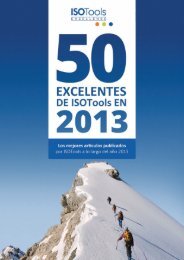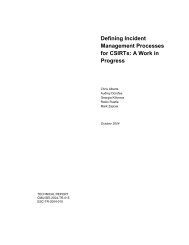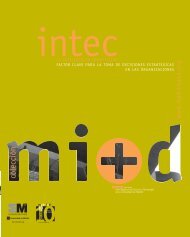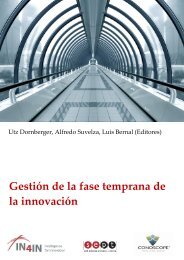The Global Innovation Index 2012
The Global Innovation Index 2012
The Global Innovation Index 2012
You also want an ePaper? Increase the reach of your titles
YUMPU automatically turns print PDFs into web optimized ePapers that Google loves.
146<br />
THE GLOBAL INNOVATION INDEX <strong>2012</strong> 8: A UNESCO Idea in Action<br />
be disseminated to consumers far<br />
and wide. In this spirit, UNESCO<br />
is elaborating a strategy to promote<br />
grassroots innovation. This strategy<br />
will focus on empowering people<br />
to use science and technology to<br />
find affordable solutions that meet<br />
the needs of the disadvantaged. <strong>The</strong><br />
strategy provides also for the popularization<br />
of science (science communication),<br />
‘technopreneurship’<br />
development, engineering, local and<br />
indigenous knowledge, and biodiversity<br />
conservation.<br />
Building capacities in basic sciences and<br />
engineering<br />
Science and engineering education<br />
is important for all countries to raise<br />
public literacy in science, engineering,<br />
and technology. This education<br />
is especially vital for developing<br />
countries so they can build a critical<br />
mass of scientists, researchers,<br />
and engineers that will allow them<br />
to participate fully in the global<br />
economy.<br />
UNESCO has extensive experience<br />
in this area through the work<br />
of its International Basic Science<br />
Programme (IBSP) and the activities<br />
of its engineering programme.<br />
We work with national governments<br />
and partners in the United Nations<br />
system as well as intergovernmental<br />
and nongovernmental organizations<br />
to promote training and research and<br />
scientific networking, and to create<br />
and strengthen centres of excellence.<br />
Public-private partnerships can be<br />
essential ingredients for effective<br />
STI. To this end, UNESCO is elaborating<br />
several agreements with private<br />
companies—such as Intel and<br />
F.Hoffman-La Roche Ltd, among<br />
others—to jointly promote science,<br />
technology, engineering, and mathematics<br />
education.<br />
Science education is essential. To<br />
attract and retain young people, we<br />
need leadership training and early<br />
career support mechanisms to be put<br />
in place at the university level. <strong>The</strong><br />
challenge is to nurture and maintain<br />
a critical mass of highly qualified<br />
and innovative scientists and technologists<br />
and to provide them with<br />
the means to pursue their research<br />
objectives. Supporting science education<br />
is an essential component of<br />
UNESCO’s action.<br />
A special focus falls here on<br />
assisting girls and young women to<br />
pursue careers in science. <strong>The</strong>se are<br />
the goals of our longstanding partnership<br />
with the L’Oreal Foundation<br />
and our annual L’Oreal-UNESCO<br />
Awards for Women in Science. It is<br />
vital to support young women scientists<br />
through such fellowships and<br />
also to increase the visibility of successful<br />
women scientists.<br />
We work also to facilitate the<br />
integration of gender perspectives,<br />
vision, knowledge, and skills into<br />
the design, implementation, and<br />
evaluation of STI policy. Women<br />
must be change agents of STI and<br />
not merely beneficiaries. We must<br />
ensure gender-balanced representation<br />
in science policy dialogue platforms<br />
and international networks,<br />
and we must support women in<br />
the transmission, preservation, and<br />
elaboration of local and indigenous<br />
knowledge related to sustainable<br />
development, natural disaster<br />
preparedness and response, biodiversity<br />
conservation, and climate<br />
change. Within this framework,<br />
a variety of activities have been<br />
conducted that include empowering<br />
women as agents of change of<br />
STI—for instance, by supporting<br />
young women scientists and facilitating<br />
cooperation and exchange of<br />
scientific knowledge among women<br />
scientists. To further these ends, in<br />
close cooperation with ISTIC we<br />
recently organized an International<br />
Forum on Women in Science and<br />
Technology in Muslim Countries<br />
that was held in Kuala Lumpur.<br />
<strong>The</strong> network of UNESCO<br />
university chairs is also specifically<br />
focused on women in S&T. Such<br />
chairs—through an integrated system<br />
of research, training, and information<br />
and documentation activities—serve<br />
as a means of facilitating collaboration<br />
on gender mainstreaming and<br />
good practices among high-level, internationally<br />
recognized researchers<br />
and teaching staff of university and<br />
other institutions in foreign countries.<br />
Networks have been established<br />
in several countries, including<br />
Argentina, Burkina Faso, Egypt,<br />
Ghana, Pakistan, Sudan, and Togo.<br />
It is vital to bolster science and<br />
engineering education through capacity<br />
building and the development<br />
of new methodologies for teaching<br />
STI. Interdisciplinary approaches are<br />
required to support innovative research<br />
and its applications for sustainable<br />
development. <strong>The</strong>se approaches<br />
must address the need to strengthen<br />
indigenous research systems and capacity;<br />
they must also involve the<br />
private sector, and especially industry,<br />
in promoting innovation and<br />
entrepreneurship among students and<br />
young professionals. South-South<br />
and North-South-South cooperation<br />
is another important lever here.<br />
Improving STI monitoring and foresight<br />
systems<br />
UNESCO also has extensive experience<br />
in supporting the dissemination<br />
of knowledge in STI policy information.<br />
This is essential for monitoring<br />
and also for sharing experience and<br />
practice.<br />
From 1965 to 1994 a number<br />
of studies and documents (totalling<br />
74 volumes) were published<br />
in UNESCO’s well-known series<br />
entitled Science Policy Studies and<br />
Documents. After 2003, UNESCO






